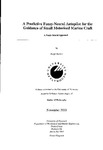A Predictive Fuzzy-Neural Autopilot for the Guidance of Small Motorised Marine Craft
| dc.contributor.author | Richter, Ralph | |
| dc.contributor.other | School of Engineering, Computing and Mathematics | en_US |
| dc.date.accessioned | 2013-11-07T13:34:02Z | |
| dc.date.available | 2013-11-07T13:34:02Z | |
| dc.date.issued | 2000 | |
| dc.identifier | NOT AVAILABLE | en_US |
| dc.identifier.uri | http://hdl.handle.net/10026.1/2665 | |
| dc.description.abstract |
This thesis investigates the design and evaluation of a control system, that is able to adapt quickly to changes in environment and steering characteristics. This type of controller is particularly suited for applications with wide-ranging working conditions such as those experienced by small motorised craft. A small motorised craft is assumed to be highly agile and prone to disturbances, being thrown off-course very easily when travelling at high speed 'but rather heavy and sluggish at low speeds. Unlike large vessels, the steering characteristics of the craft will change tremendously with a change in forward speed. Any new design of autopilot needs to be to compensate for these changes in dynamic characteristics to maintain near optimal levels of performance. This study identities the problems that need to be overcome and the variables involved. A self-organising fuzzy logic controller is developed and tested in simulation. This type of controller learns on-line but has certain performance limitations. The major original contribution of this research investigation is the development of an improved self-adaptive and predictive control concept, the Predictive Self-organising Fuzzy Logic Controller (PSoFLC). The novel feature of the control algorithm is that is uses a neural network as a predictive simulator of the boat's future response and this network is then incorporated into the control loop to improve the course changing, as well as course keeping capabilities of the autopilot investigated. The autopilot is tested in simulation to validate the working principle of the concept and to demonstrate the self-tuning of the control parameters. Further work is required to establish the suitability of the proposed novel concept to other control. | en_US |
| dc.language.iso | en | en_US |
| dc.publisher | University of Plymouth | en_US |
| dc.title | A Predictive Fuzzy-Neural Autopilot for the Guidance of Small Motorised Marine Craft | en_US |
| dc.type | Thesis | |
| plymouth.version | Full version | en_US |
| dc.identifier.doi | http://dx.doi.org/10.24382/4663 | |
| dc.identifier.doi | http://dx.doi.org/10.24382/4663 |
Files in this item
This item appears in the following Collection(s)
-
01 Research Theses Main Collection
Research Theses Main


